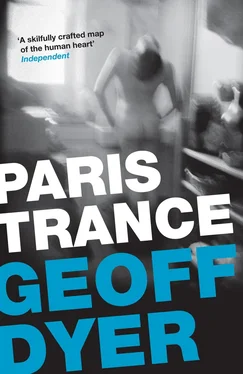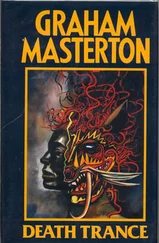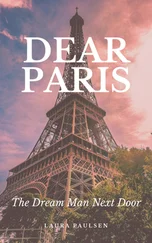One evening Pierre pushed back his chair, took off his glasses, stretched his arms upwards and outwards to relieve — and signal the end of — the accumulated stress of eight hours of hard work, and suggested a drink.
‘I’m sorry. I have to go home.’
‘To your boyfriend? What’s his name?’
‘Luke.’
‘Luke, yes. How is his ankle?’
‘He moans and groans but he is getting better, I think. .’
‘It must be frustrating, physically,’ said Pierre. ‘For him, I mean.’
‘He wishes he could play football.’
‘I’m sure. Oh well, another time maybe.’
‘Yes, for sure.’ Nicole gathered up her things and put her jacket on. ‘Au revoir Pierre.’
‘Au revoir Nicole.’ He watched her leave, noticing about her the same things that Luke had noticed.
The weather became warmer, the days longer. One particular Sunday, Sahra declared, was The Day That Was The First Sunday of Spring, the first day when it was warm enough to sit comfortably in the sun on a café terrace. The four friends met at the Café Bastille but the terrace was jam-packed so they went to the Kanterbrau which was also packed. All cafés with terraces were packed so they went back to the Bastille and waited for fifteen minutes before a table became available. It would have been an even longer wait if Luke had not had his crutches.
People were crowded together as tightly and neatly as an audience at a cinema but here they were both audience and subject; in watching everyone else they were watching themselves. Everyone had a part to play and everyone played the same part. In these circumstances, sunglasses — looked at, looked through — came into their own. Implicit in the idea of sitting on the café terrace was both question (‘It’s nice sitting here isn’t it?’) and response (‘Yes, lovely’) and all conversations were more or less elaborate versions of this basic call-and-response of reflexive affirmation: ‘What better place to be in the world than here at this café?’ ‘Nowhere, this is perfect.’ The friends sat together, playing their part, letting the sun warm them. It grew hot. Nicole took off her cardigan. Her arms were thin, pale.
‘I’ve developed a liking for olives,’ said Alex.
‘I hate them,’ said Luke.
‘I’ve always liked them,’ said Sahra who wanted to write down the recipe of a meal that Luke had cooked for everyone a few nights previously. Nicole thought she had a pen and began looking in her bag.
‘Oh no,’ said Luke. ‘Every time I see Nicole looking in her bag like that I get tense. Implicit in the idea of rummaging is not finding, and implicit in not finding is losing: usually something of great importance, i.e. belonging to me. Oh how I used to love my property.’
‘Used to?’
‘I’ve had to renounce it as a condition of being with Nicole. Now all the things I most love are Nicole’s. That is to say they were mine once and either she’s broken or lost them, or has come to have absolute ownership of them.’
It was true. The surprising thing was that he had come to love Nicole’s infuriating disregard for her — and his — things. Every time he saw her wearing a favourite dress — the blue one, for example, with the knotted halter neck that he had bought in a sale at the shop next to a place where they had eaten minestrone soup one lunch-time in November — was, potentially, the last. There was no telling how or when she was going to ruin or lose it.
After dredging the depths of her bag Nicole triumphantly held a pencil aloft. It was broken, unfortunately, prompting another bout of rummaging. This time she came up with a pencil sharpener, shaped like a jet whose cockpit gradually filled up with shavings from the pencil. Sahra wrote down the recipe. They ordered another round of coffees. Alex took off his sweater and said how greatly the discovery of fabric conditioner had improved his life. Luke also took off his sweater, revealing a T-shirt of which he was immensely proud. Across the front, in red letters, was written: try burning this flag, asshole. Sahra loved it too. Nicole was unsure. Alex asked him to put his sweater back on. Miles walked by, laden down with shopping from the market. Luke called out, waved. Miles called back that he couldn’t stop: ‘omelettes to make, wine to drink’. A young woman distributed green pieces of paper which demonstrated the deaf and dumb alphabet. She returned a few minutes later, smiling, silent, and picked them up again. A waiter, carrying a full tray of drinks, tripped over Luke’s crutches. He looked like he was about to go flying but managed, somehow, to stay on his feet and keep the tray level. It was an heroic, awe-inspiring performance, applauded warmly by all who witnessed it, especially Luke. The phone box opposite was out of order. One person after another went in, tried to call, and came out looking disappointed and, surrounded as they were by the many people using mobile phones, anachronistic. Trees were coming into leaf. The traffic lights went about their business.
‘What shall we do next?’ said Alex.
‘Sit here some more,’ said Sahra.
‘We could ride the 29,’ said Luke. ‘That is, we could ride the 29 if it wasn’t a Sunday.’
‘When are we going to start shooting the movie Luke?’
‘ Route 29 ? Today would have been perfect but the frigging 29 doesn’t run on a Sunday.’
‘Plus there is the small obstacle of not having a camera,’ said Sahra.
‘A mere detail,’ said Luke. They sat just looking for a while. At each other and the people going by, looking at the people who were sitting down, looking.
‘What about seeing a film?’ said Luke. ‘As opposed to making one.’
‘In this weather? Crazy.’
‘A searing indictment of racism, that’s what I’m in the mood for. Or maybe a film noir where people are always turning up their collars against the rain and throwing cigarettes into gutters.’
‘Or throwing away the murder weapon.’
‘A great trope, that.’
‘They’re all lovely tropes.’
‘Some are horrible,’ said Sahra. ‘I hate the laugh that turns into a deranged cackle.’
‘I hate that too,’ said Nicole.
‘Me too.’
‘And me.’
‘I like the Styrofoam cups that the cops drink coffee out of on a stake-out. Sitting in a car, eating burgers and drinking out of Styrofoam cups.’
‘Tossing the Styrofoam cups out of the window and squealing the car round when the dealer — “It’s him!” — finally shows.’
‘Or drinking out of them in the overworked precinct. A place where the phones are always ringing.’
‘Hookers being brought in.’
‘Handcuffed Chicanos.’
‘The phones always ringing.’
‘Desks crowded with papers and Styrofoam cups.’
‘The Styrofoam cup is crucial. It’s easier to knock over when you’re rummaging through your papers on your over-worked desk. The spilled coffee adds to the chaos.’
‘Also to throw it in the bin in the corridor as a way of emphasising a point. Walking along a corridor, tie askew, on your way to interview—’
‘Q and A.’
‘Right. The shooter—’
‘The perp.’
‘Right again. Shoulder holster revealed. Tie askew, drinking coffee from a Styrofoam cup, draining the last drops and throwing it in the bin.’
‘Maybe we should go to a film,’ said Alex. ‘Could you pass me Pariscope , please Sahra?’
An hour later they were in the cinema, watching a film from the pre-Styrofoam era: The Man With the X-ray Eyes.
‘A parable,’ claimed Alex afterwards, ‘if ever there was one.’
A month after trashing his ankle — a month of shoving knitting needles down the cast to ease the itching which doing so exacerbated — Luke had the plaster removed. He was shocked when he saw his leg, amazed at how withered, white and useless it had become. The physio instructed him in exercises to build up the muscles in his legs and to restore movement in his ankle.
Читать дальше












